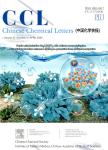Polymeric aluminum porphyrin:Controllable synthesis of ultra-low molecular weight CO_(2)-based polyols
作者机构:Key Laboratory of Polymer EcomaterialsChangchun Institute of Applied ChemistryChinese Academy of SciencesChangchun 130022China University of Science and Technology of ChinaHefei 230026China
出 版 物:《中国化学快报:英文版》 (Chinese Chemical Letters)
年 卷 期:2023年第34卷第8期
页 面:434-438页
核心收录:
学科分类:081704[工学-应用化学] 07[理学] 070304[理学-物理化学(含∶化学物理)] 08[工学] 0817[工学-化学工程与技术] 0703[理学-化学]
基 金:The authors greatly appreciated the financial support from National Natural Science Foundation of China(Nos.22101277 51988102 22271275 22201280)
主 题:CO_(2)-polyols Polymeric catalyst Aluminum porphyrin Ultra-low molecular weight Proton tolerance
摘 要:Carbon dioxide-based polyols with ultra-low molecular weight(ULMW,Mn1000 g/mol)are emergent polyurethane precursors with economic and environmental ***,the lack of effective proton-tolerant catalytic systems limits the development of this *** this work,the polymeric aluminum porphyrin catalyst(PAPC)system was applied to the copolymerization of CO_(2)and propylene oxide,where sebacic acid,bisphenol A,poly(ethylene glycol),and water were used as chain transfer agents to achieve the controlled synthesis of CO_(2)-*** molecular weight of the resulting CO_(2)-polyols could be facilely regulated in the range of 400–930 g/mol at low catalyst loadings,fully demonstrating its catalytic advantages of high activity,high product selectivity,and excellent proton tolerance of ***,the catalytic efficiency of PAPC could reach up to 2.1–5.2 kg/g under organic CTA conditions,even reaching 1.9 kg/g using water as the *** cPC content could be controlled within 1.0 wt%under the optimized conditions,indicating the excellent controllability of the PAPC *** CO_(2)-polyols combines the advantages of low viscosity(∼3000 mPa s at 25°C),low glass transition temperature(∼−73°C),and high carbonate unit content(∼40%),which is important for the development of high-performance polyurethanes.



